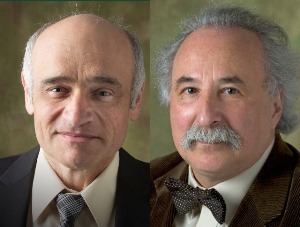Oct 1 2014
A team of researchers from Clarkson University and the University of Missouri have secured a grant from the National Science Foundation for their work in nano-biosensing.
 Vladimir Privman, professor of physics / Robert A. Plane Endowed Chair, left, and Evgeny Katz, professor of chemistry and biomolecular science / Milton Kerker Chair in Colloid Science.
Vladimir Privman, professor of physics / Robert A. Plane Endowed Chair, left, and Evgeny Katz, professor of chemistry and biomolecular science / Milton Kerker Chair in Colloid Science.
The NSF Nano-Biosensing program has awarded a grant to professors from Clarkson and the University of Missouri for their project, "Collaborative Research: Sense-and-Act Systems for Substance Release Modeling Drug Delivery Triggered by Immune-Sensing Based on Nanostructured Electrodes."
Evgeny Katz, professor of chemistry and biomolecular science / Milton Kerker Chair in Colloid Science; Vladimir Privman, professor of physics / Robert A. Plane Endowed Chair; and collaborator Luis A. Martinez-Lemus, research investigator / associate professor in medical pharmacology at the University of Missouri comprise the research team.
The award grants $330,000 to the Clarkson team and $50,000 to the collaborator over three years, and Katz said the money will support students and post-doctoral work on the project. He said the probability of getting a grant such as this is small because many people work in the field of biosensors.
"This program is such a broad area, so the number of proposals is really huge because of the great number of applications," he said. "I believe this award is a great success for us because of the very high competition."
The researchers' proposed program contributes to the advancement of "smart" bioanalytical systems capable not only of analyzing the health conditions but also of taking automated actions releasing a drug or performing a physical treatment to compensate for health threatening conditions. This approach ultimately can result in personalized medicine when drug application is adjusted for a particular individual in terms of dosage and timing.
The proposed program is specifically tailored to address important demands of modern bioelectronics, biosensing and biomedical applications. Ultimately, this research contributes to new developments in the area of implantable bioelectronics devices for future biomedical applications.
Katz said NSF supports the development of new concepts in science, while other funding agencies would support the medical applications of the research.
"We are not expecting immediate medical applications, but we are developing new processes for biosensing for diseases such as cancer," he said.
The NSF Nano-Biosensing program supports engineering research on innovative, transformative and insightful applications that use nano-scale bio-inspired engineering principles and approaches. The program is especially interested in the intersection of engineering, life sciences and information technology, with an emphasis on research in the areas of monitoring, identification or quantification of biological signals.
Clarkson University launches leaders into the global economy. One in five alumni already leads as a CEO, VP or equivalent senior executive of a company. Located just outside the Adirondack Park in Potsdam, N.Y., Clarkson is a nationally recognized research university for undergraduates with select graduate programs in signature areas of academic excellence directed toward the world’s pressing issues. Through 50 rigorous programs of study in engineering, business, arts, sciences and the health professions, the entire learning-living community spans boundaries across disciplines, nations and cultures to build powers of observation, challenge the status quo, and connect discovery and engineering innovation with enterprise.
Source: http://clarkson.edu/